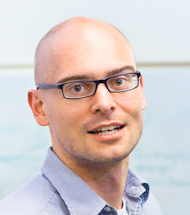 Pieter Abbeel | Pieter Abbeel received a BS/MS in Electrical Engineering from KU Leuven (Belgium) and received his Ph.D. degree in Computer Science from Stanford University in 2008. He joined the faculty at UC Berkeley in Fall 2008, with an appointment in the Department of Electrical Engineering and Computer Sciences. He has won various awards, including best paper awards at ICML and ICRA, the Sloan Fellowship, the Air Force Office of Scientific Research Young Investigator Program (AFOSR-YIP) award, the Office of Naval Research Young Investigator Program (ONR-YIP) award, the Okawa Foundation award, the TR35, the IEEE Robotics and Automation Society (RAS) Early Career Award, and the Dick Volz Best U.S. Ph.D. Thesis in Robotics and Automation Award. He has developed apprenticeship learning algorithms which have enabled advanced helicopter aerobatics, including maneuvers such as tic-tocs, chaos and auto-rotation, which only exceptional human pilots can perform. His group has also enabled the first end-to-end completion of reliably picking up a crumpled laundry article and folding it. His work has been featured in many popular press outlets, including BBC, New York Times, MIT Technology Review, Discovery Channel, SmartPlanet and Wired. His current research focuses on robotics and machine learning with a particular focus on challenges in personal robotics, surgical robotics and connectomics. |
|---|---|
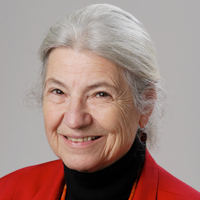 Ruzena Bajcsy | Ruzena Bajcsy is an American computer scientist who specializes in robotics. She is Professor of Electrical Engineering and Computer Science at the University of California, Berkeley, where she is also Director Emerita of CITRIS (the Center for Information Technology Research in the Interest of Society). She was previously Professor (and Chair) of Computer Science and Engineering at the University of Pennsylvania, where she was Director (and founder) of the University of Pennsylvania's General Robotics and Active Sensory Perception Laboratory, and a member of the Neurosciences Institute in the School of Medicine. She has also been head of the National Science Foundation's Computer and Information Science and Engineering Directorate, with authority over a $500 million budget. She has received numerous awards and honors, including the Association for Computing Machinery (ACM)/Association for the Advancement of Artificial Intelligence Allen Newell Award in 2001, the ACM Distinguished Service Award in 2003, the Computing Research Association Distinguished Service Award in 2003, and the 2009 Benjamin Franklin Medal in Computer and Cognitive Science for her innovations in robotics and computer vision, specifically the development of improved robotic perception and the creation of better methods to analyze medical images. She has also been named by the IEEE Board of Directors the recipient of the 2013 IEEE Robotics and Automation Award for her contributions in the field of robotics and automation with the following citation: "For contributions to computer vision, the active perception paradigm, and medical robotics". |
 Brandon Basso | Brandon Basso earned his Ph.D. from UC Berkeley in Mechanical Engineering and currently serves as Senior Research and Development Engineer at 3D Robotics. While at Berkeley, he was a member of the Center for Collaborative Control of Unmanned Vehicles under the direction of Karl Hedrick. His research involved controlling teams of small UAVs performing collaborative search/track tasks. At 3D Robotics, Brandon is developing aerial mapping solutions on autonomous fixed-wing and multirotor aircraft. The solutions are targeted at the agricultural industry for the purpose of increasing farm yield by providing farmers with accurate aerial imagery for crop analysis. |
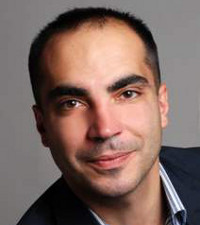 Francesco Borrelli | Francesco Borrelli received the `Laurea' degree in computer science engineering in 1998 from the University of Naples `Federico II', Italy. In 2002 he received the PhD from the Automatic Control Laboratory at ETH-Zurich, Switzerland. He is currently an Associate Professor at the Department of Mechanical Engineering of the University of California at Berkeley, USA. He is the author of more than fifty publications and in the field of predictive control. He is author of the book Constrained Optimal Control of Linear and Hybrid Systems published by Springer Verlag, the winner of the `Innovation Prize 2004' from the ElectroSwiss Foundation and the winner of the 2009 NSF CAREER award. In 2008 he was appointed the chair of the IEEE technical committee on automotive control. His research interests include constrained optimal control, model predictive control and its application to advanced automotive control and energy efficient building operation. |
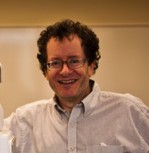 Gary Bradski | Dr. Gary Rost Bradski holds a joint appointment as Consulting Professor in Stanford University's Computer Sciences Department where he teaches a course in Robot Perception. He has 69 publications and 32 patents. Dr. Bradski founded and directs the Open Source Computer Vision Library (OpenCV), now a non-profit foundation, that is used globally in research, government and commercial applications with over 5M downloads to date. He led the computer vision team for Stanley, the Stanford robot that won the $2M DARPA Grand Challenge and more recently he helped in the founding of the Stanford Artificial Intelligence Robot (STAIR) project under the leadership of Professor Andrew Ng. Dr. Bradski published a book for O'Reilly Press: Learning OpenCV: Computer Vision with the OpenCV Library which has been the best selling text in computer vision and machine learning for 3 years now. |
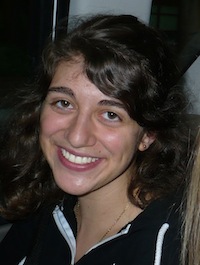 Elena Carano | Elena Carano is a PhD student in the Mechanical Engineering department at UC Berkeley. She earned her B.S. degree from the Mechanical Engineering department at Stanford University. She works with Karl Hedrick in the Vehicle Dynamics and Control Lab. She focuses on developing task allocation and path planning algorithms that incorporate humans as peer agents on heterogeneous teams. |
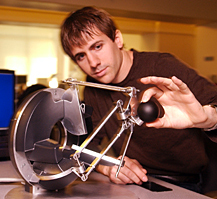 Francois Conti | Francois Conti is a PhD student in the Computer Science department at Stanford University. He works with Oussama Khatib in the Artificial Intelligence (AI) Lab. His research interests include medical robotics, haptic interface design, computer imaging and simulation. He also co-teaches the CS-277 Experimental Haptics class at Stanford University with Ken Salibury and Federico Barbagli. He is also actively involved in the development of the open source haptics framework CHAI 3D. In recent years, he has also conducted a number of product developments in the area of haptic interface design and robotic systems which are used today in the medical, aerospace and entertainment fields. A selection of these systems are currently manufactured and commercialized by Force Dimension, a company that he co-founded with three other colleagues in 2001. |
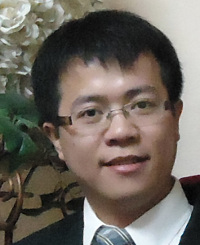 Wenjie Chen | Wenjie Chen is currently a postdoctoral scholar in the Mechanical Systems Control Lab in the Department of Mechanical Engineering at UC Berkeley. He works with Masayoshi Tomizuka on the several research projects including "A Hybrid Control Systems Approach to Brain-Machine Interfaces for Exoskeleton Control" and "Intelligent Control of Robot Manipulators for Performance Enhancement". He earned his M.S. and Ph.D. degrees both in Mechanical Engineering from UC Berkeley in May 2009 and August 2012, respectively. Prior to coming to UC Berkeley, he was an undergraduate student in Zhejiang University with a major in Mechatronic Engineering and also honored in Advanced Class of Engineering Education (ACEE), where he got his Bachelors degree in June 2007. |
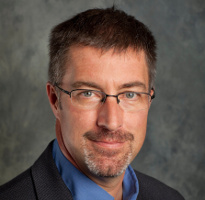 Steve Cousins | Steve Cousins, CEO, was formerly the President and CEO of Willow Garage. During his tenure, Willow Garage created the PR2 robot, the open source TurtleBot, and the robot operating system (ROS), and spun off 8 companies: Suitable Technologies (maker of the Beam remote presence system), Industrial Perception, Inc., Redwood Robotics, HiDOF (ROS and robotics consulting), Unbounded Robotics (still in stealth mode), The Open Source Robotics Foundation, The OpenCV Foundation, The Open Perception Foundation. Before joining Willow Garage, Steve was a senior manager at IBM's Almaden Research Center, and a member of the senior staff at Xerox PARC. Steve holds a Ph.D. from Stanford University, and BS and MS degrees in computer science from Washington University. |
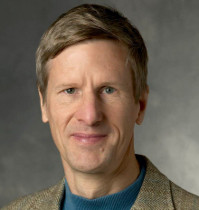 Marc Cutkosky | Mark R. Cutkosky serves as the Fletcher Jones II Professor and a co-director of the Center for Design Research. Dr. Cutkosky joined Stanford Mechanical Engineering Dept. in the Design Division in 1985 after working for several years in the Robotics Institute at Carnegie-Mellon University and as a machine design engineer at ALCOA, in Pittsburgh, Pennsylvania. His research interests include robotic manipulation and tactile sensing and the design and fabrication of small, biologically inspired robots using layered manufacturing methods. He serves as a principal investigator of the Design Interface for 3D Manufacturing and Biomimetic Robotics projects at the Center for Design Research, Director of the Dextrous Manipulation Lab, and a Co-Director of the Stanford Alliance for Innovative Manufacturing. Dr. Cutkosky serves as a Member of Advisory Board at IFOS, Inc. Dr. Cutkosky's awards and honors include: Fulbright Distinguished Chair for Mechatronics, Pisa, Italy in 2002; JSPS fellowship, Japan in 2001; Charles M. Pigott Professorship in 1996; Best paper awards, ASEE Symposium in 2000 & ASME Database Symposium in 1994; Outstanding paper award, IEEE ICRA in 1993; Anderson Faculty Scholar in 1989 and NSF President Young Investigator in 1986. Dr. Cutkosky received his PhD in 1985 and MS in 1982, both in Mechanical Engineering from Carnegie-Mellon University, and BS in 1978 in Mechanical Engineering from University of Rochester. |
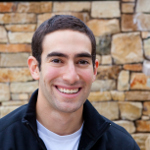 Eitan Marder-Eppstein | Eitan has programmed robots to do many things, but is most proud of his work to have a robot fetch beer ordered from a web application. Before hiDOF, Eitan worked as a Senior Software Engineer at Willow Garage, focusing on autonomous navigation, mapping, planning, probabilistic estimation, multi-robot coordination, techniques to store, visualize, and process large amounts of 3D sensor data, and effective software interfaces for distributed robotic systems. Eitan is the author of Willow Garage’s autonomous navigation software used on dozens of robots around the world, and has participated in technology transfer projects to turn proof-of-concept systems into robust products. Eitan received both his M.S. and B.S. degrees in Computer Science from Washington University in St. Louis. |
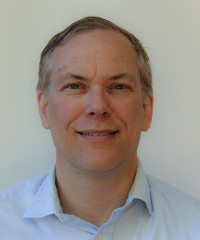 Ron Fearing | Ronald Fearing is a professor in the Dept. of Electrical Engineering and Computer Sciences at Univ. of California, Berkeley, which he joined in Jan. 1988. He was Vice-Chair for Undergraduate Matters from 2000-2006. His current research interests are in milli-robotics, including flying and crawling milli-robots, parallel nano-grasping (gecko adhesion), micro-assembly, and rapid prototyping. He has worked in tactile sensing, teletaction, and dextrous manipulation. He has a PhD from Stanford in EE (1988) and SB and SM in EECS from MIT (1983). He received the Presidential Young Investigator Award in 1991, and is the co-inventor on 14 US and international patents. |
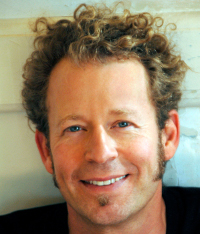 Ken Goldberg | Ken Goldberg is craigslist Distinguished Professor of New Media at UC Berkeley, where he and his students investigate robotics, art, and social media. Goldberg directs the Automation Sciences Research lab and is Faculty Director of the CITRIS Data and Democracy Initiative. Goldberg earned dual degrees in Electrical Engineering and Economics from the University of Pennsylvania (1984) and MS and PhD degrees from Carnegie Mellon University (1990). He joined the UC Berkeley faculty in 1995 where he is Professor of Industrial Engineering and Operations Research (IEOR), with secondary appointments in Electrical Engineering/Computer Science (EECS), Art Practice, the School of Information, and in the Department of Radiation Oncology at the UCSF Medical School. Goldberg has published over 170 peer-reviewed technical papers on algorithms for robotics, automation, and social information filtering; his inventions have been awarded eight US Patents. He is Editor-in-Chief of the IEEE Transactions on Automation Science and Engineering (T-ASE), Co-Founder of the African Robotics Network (AFRON), Co-Founder of the Berkeley Center for New Media (BCNM), Co-Founder and CTO of Hybrid Wisdom Labs, Co-Founder of the Moxie Institute, and Founding Director of UC Berkeley's Art, Technology, and Culture Lecture Series. Goldberg was awarded the Presidential Faculty Fellowship in 1995 by President Clinton, the National Science Foundation Faculty Fellowship in 1994, the Joseph Engelberger Robotics Award in 2000, and elected IEEE Fellow in 2005. Goldberg lives in the Bay Area with his daughters and wife, filmmaker and Webby Awards founder Tiffany Shlain. |
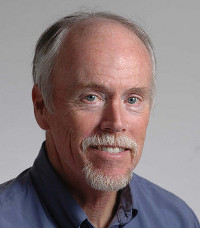 Karl Hedrick | Karl Hedrick is the James Marshall Wells professor of Mechanical Engineering at the University of California at Berkeley and the director of Berkeley’s Vehicle Dynamics Laboratory as well as the principal investigator of the Office of Naval Research center at Berkeley, the Center for the Collaborative Control of Unmanned Vehicles. He served as chair of the Mechanical Engineering department at UC Berkeley (1999-2004) and director of the University of California PATH (Partners for Advanced Transit and Highways) Research Center (1997-2003). Prior to joining the faculty at UC Berkeley, Hedrick was a professor of Mechanical Engineering (1974-88) at the Massachusetts Institute of Technology, Cambridge, where he directed the Vehicle Dynamics Laboratory. Hedrick has made seminal contributions to nonlinear estimation and control, from describing functions to sliding mode observers, sliding mode control and dynamic surface control. His research has concentrated on the development of nonlinear control theory and on its application to a broad variety of transportation systems including automated highway systems, power train control, embedded software design, formation flight of autonomous vehicles and active suspension systems. A recognized expert in transportation systems, Hedrick has more than 110 archival journal publications. Among his honors are an Outstanding Paper Award (1998) from the Institute of Electrical and Electronics Engineers and the American Automatic Control Council’s O. Hugo Schuck Best Paper Award (2003). He received the ASME Division of Dynamic Systems and Control’s Outstanding Investigator Award (2002) and received the ASME Journal of Dynamic Systems, Measurement and Control Best Paper award in 1983 and 2001. He is the recipient of the ASME’s 2006 Rufus Oldenburger Medal. Hedrick received his bachelor’s degree in Engineering Mechanics at the University of Michigan, Ann Arbor, in 1966. He earned his MS and Ph.D. in Aeronautical and Astronautical Engineering at Stanford University, California, in 1970 and 1971, respectively. |
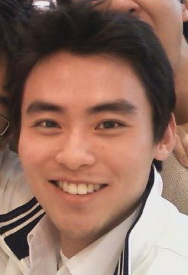 Sanghyun Hong | Sanghyun Hong is a PhD student in the Mechanical Engineering department at UC Berkeley. He works with Kark Hedrick in the Vehicle Dynamics and Control Lab. He earned his B.S. degree from the Mechanical Engineering department at Seoul National University (South Korea), and M.S. degree from Mechanical Engineering department at UC Berkeley. He focuses on developing vehicle inertial parameter estimation algorithms and incorporating them into the vehicle active safety control. |
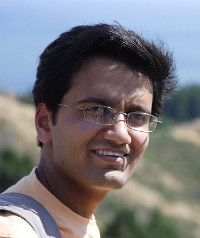 Advait Jain | Advait Jain is a co-founder and senior engineer at Redwood Robotics. Before that, he received a Ph.D. in Robotics from Georgia Tech and a B.Tech. in Computer Science from the Indian Institute of Technology (IIT), Delhi. His work includes developing software and sensors (including fabric-based whole-arm tactile sensors) to enable three different human-scale mobile manipulators effectively perform manipulation tasks. |
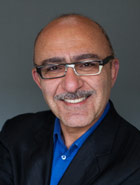 Homayoon Kazerooni | Dr. Kazerooni is a Professor in the Mechanical Engineering Department at the University of California, Berkeley and director of the Berkeley Robotics and Human Engineering Laboratory. The laboratory’s mission is to develop fundamental scientific and engineering principles on robotics, control sciences, exoskeletons, and bioengineering. Dr. Kazerooni is also the founder of Ekso Bionics. Most of the developed technologies in this lab have found their ways to market. Prior to his research work on lower extremity exoskeletons, Dr. Kazerooni led his team to successfully develop robotics systems that enhance human upper extremity strength. The results of this work led to a new class of intelligent assist devices currently being used by workers worldwide for manipulating heavy objects in distribution centers and factories. Dr. Kazerooni holds a Doctorate in Mechanical Engineering from MIT and has published more than two hundred articles, delivered over 100 plenary lectures in the U.S. and internationally, and holds numerous pertinent patents and awards. As a noted authority on robotics, he is frequently profiled and quoted in the media. |
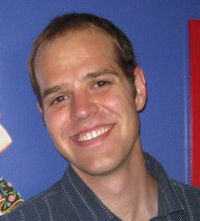 Ben Kehoe | Ben Kehoe is a PhD student in Mechanical Engineering, working in the Automation Sciences Lab under Ken Goldberg. He has experience in fields including physics, enterprise software engineering, and controls for unmanned aerial vehicles. His currently research is on surgical robotics, grasping, and cloud robotics. |
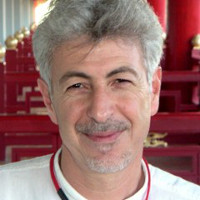 Oussama Khatib | Oussama Khatib received his Doctorate degree in Electrical Engineering from Sup’Aero, Toulouse, France, in 1980. He is Professor of Computer Science at Stanford University. He is Co-Editor of the Springer Tracts in Advanced Robotics series, and has served on the Editorial Boards of several journals as well as Chair or Co-Chair for numerous international conferences. He co-edited the Springer Handbook of Robotics, which received the PROSE Award for Excellence in Physical Sciences & Mathematics and was also the winner in the category Engineering & Technology. He is a Fellow of IEEE and has served RAS as a Distinguished Lecturer, as a member of the Administrative Committee, and as the Program Chair of ICRA 2000. He is the President of the International Foundation of Robotics Research (IFRR) and a recipient of the Japan Robot Association (JARA) Award in Research and Development. |
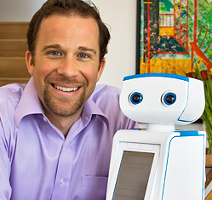 Cory Kidd | Cory D. Kidd, Ph.D. is Founder and CEO of Intuitive Automata. Cory earned his Ph.D. in human-robot interaction from the MIT Media Lab and is a leading practitioner in the field. His extensive experience in human-robot interaction and developing novel technology for healthcare applications for the last 10 years is a key to Intuitive Automata’s success. He also earned his MS in Media Arts and Sciences from the MIT Media Lab and his BS in Computer Science from the Georgia Institute of Technology. Prior to coming to MIT, he was a Research Faculty member in the College of Computing at Georgia Tech after finishing a bachelors degree there. His research was in ubiquitous computing, where he worked on the Aware Home Research Initiative, a research project exploring applications in an intelligent home environment. Much of the work focused on finding ways to allow an elderly person to live in their own home longer rather than moving into an assisted living facility. |
 Kurt Konolige | Kurt Konolige has been a Senior Computer Scientist at SRI International, and a Senior Researcher at Willow Garage, Inc. He is a consulting professor in Computer Science and AI at Stanford University, and a Fellow of AAAI. He received his PhD in Computer Science from Stanford University in 1984. He founded Videre Design, LLC, a maker of stereo hardware and software, and co-founded ActivMedia Robotics (later MobileRobots). Kurt's recent research has concentrated on realtime perception and navigation for mobile robots, especially using vision. He has been an invited lecturer at universities and institutions in many different countries, and has been on the editorial board of various academic publications, including Fundamenta Informaticae Journal of Applied Non-Classical Logics, International Journal of Applied Intelligence, Artificial Intelligence Journal, Journal of Artificial Intelligence Research, and Autonomous Robots. He has authored over 100 scientific publications, including 3 books and Best Paper awards at several major AI and Robotics conferences. |
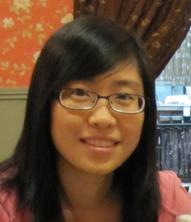 Theresa Lin | Theresa Lin is a PhD student in the Mechanical Engineering department at UC Berkeley. She works with Francesco Borrelli in the Model Predictive Control (MPC) Lab. Her research focuses on the application of model predictive control for advanced vehicles. In particular, she focuses on the active safety of cyber-physical systems. She earned her Bachelors degree from the Mechatronics Engineering department at the University of Auckland. |
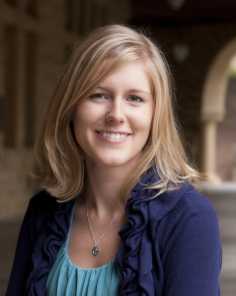 Ann Majewicz | Ann Majewicz is a PhD student in the Mechanical Engineering department at Stanford University. She is currently working with Allison Okamura in the CHARM Lab on bringing robotic needle steering one step closer to clinical use. She earned her M.S. degree from Johns Hopkins University in 2010 and her B.S. degree in Mechanical and Electrical Engineering from University of St. Thomas, Minnesota. |
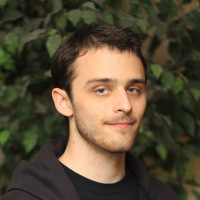 Stephen Miller | Stephen Miller is a PhD student at Stanford University studying Computer Science, with interests in Computer Vision, Machine Learning, and Robotics. Lately his focus has been on RGB-D perception. He currently works with Sebastian Thrun and Vladlen Koltun, though you might also catch him pushing to PCL and other Open Perception-affiliated projects. He is a NSF, SGF, and Hertz Fellow. When not working with robots, he enjoys playing guitar, traveling, and occasionally reviewing movies. |
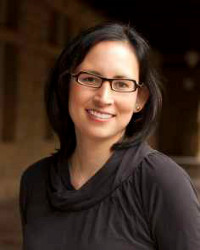 Allison Okamura | Allison M. Okamura received the BS degree from the University of California at Berkeley in 1994, and the MS and PhD degrees from Stanford University in 1996 and 2000, respectively, all in mechanical engineering. She is currently Associate Professor in the mechanical engineering department at Stanford University. She was previously Professor and Vice Chair of mechanical engineering at Johns Hopkins University. She has been an associate editor of the IEEE Transactions on Haptics, an editor of the IEEE International Conference on Robotics and Automation Conference Editorial Board, and co-chair of the IEEE Haptics Symposium. Her awards include the 2009 IEEE Technical Committee on Haptics Early Career Award, the 2005 IEEE Robotics and Automation Society Early Academic Career Award, and the 2004 NSF CAREER Award. She is an IEEE Fellow. Her academic interests include haptics, teleoperation, virtual environments and simulators, medical robotics, neuromechanics and rehabilitation, prosthetics, and engineering education. Outside academia, she enjoys spending time with her husband and two children, running, and playing ice hockey. |
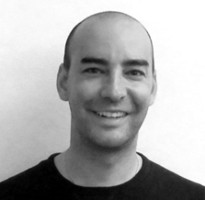 Mark Palatucci | Mark Palatucci is the Co-Founder and Chief Product Officer of Anki. At Anki, Mark is part of the core-team that developed Anki Drive, the robotic racing game introduced by Tim Cook at Apple's WWDC event earlier this year. Mark helped grow Anki from a three-person founding team with a kitchen table prototype, to a 50-person venture backed company that mass produces thousands of robots each day. Prior to founding Anki, Mark received his Ph.D from the Robotics Institute of Carnegie Mellon, where he was supported by NSF and Intel graduate fellowships. His research interests include machine learning and pattern recognition. |
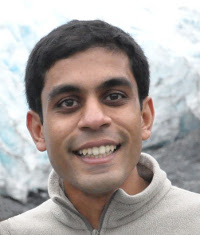 Sachin Patil | Sachin Patil is a postdoctoral researcher in the EECS department at UC Berkeley. He is currently working with Pieter Abbeel and Ken Goldberg on enabling cost-effective robots to reliably execute tasks under uncertainty. His research interests include motion planning, medical robotics, and physically-based simulation. He earned his M.S. and Ph.D. degrees from UNC Chapel Hill and his B.Tech degree from IIT Bombay. |
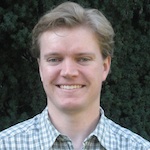 Steven Peters | Steven Peters joined the Open Source Robotics Foundation in November 2012 after completing his dissertation in the MIT Robotic Mobility Group, under the direction of Karl Iagnemma. At MIT, he developed sensing and control techniques for collision avoidance and rollover prevention of passenger vehicles. He has experience with high-fidelity simulation of robot and vehicle dynamics as well as implementation of real-time control algorithms on passenger vehicles and robotic manipulators. He helped create the MIT Energy Map website to visualize energy usage in over 100 buildings on the MIT campus. He was also a member of the UC Davis 2002 and 2003 FutureTruck hybrid electric vehicle design competitions. |
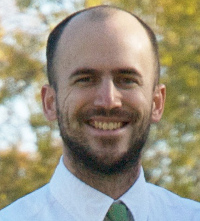 Morgan Quigley | Morgan Quigley joined the Open Source Robotics Foundation in August 2012 after completing his dissertation defense in the Stanford Artificial Intelligence Laboratory, under the supervision of Professor Andrew Ng. At Stanford, he developed hardware and software systems for personal robots, including the design and initial implementation of the Robot Operating System (ROS) in close collaboration with colleagues at Willow Garage, including several who are now at the Open Source Robotics Foundation. On the hardware side, Morgan was the electrical and software designer for the low-cost, highly dexterous hand produced for the 2010-2012 DARPA ARM-H program on a team led by Curt Salisbury of Sandia National Laboratories. Other projects have included wifi-based indoor localization, sensor and embedded computing design for low-cost manipulators, high-resolution short-range depth scanners, multi-band software defined radio (SDR) for navigation applications, and miniature UAV software and hardware. |
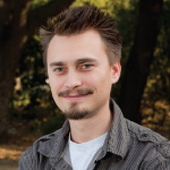 Radu Rusu | Radu B. Rusu is the President and CEO of Open Perception, Inc, a Visiting Lecturer at Stanford University, and a world renowned expert in 3D data processing with over 10 years of experience in the field. Before Open Perception, Radu was a Research Scientist at Willow Garage where he created the Point Cloud Library (PCL) project. Radu received his Ph.D. in Computer Science from the Technische Universitaet Muenchen (TUM), Germany in 2009 with summa cum laude. During his Ph.D., Radu was affiliated with the CoTeSys (Cognition for Technical Systems) excellence cluster at TUM, the AIC (Artificial Intelligence Center) at SRI (Stanford Research Institute) as an International Fellow Researcher, and Willow Garage, working on 3D semantic mapping techniques for mobile robots. Over the past years, Radu has been on the board of many workshops and scientific events in the field, held at prestigious conferences such as: RSS, ICRA, IROS, ECCV, ICCV, AAAI, CVPR, 3DIMPVT, etc. He has co-/authored over 70 peer-reviewed scientific publications, including 2 books, and three best paper awards and nominations (ICAR 2009, RSS 2011, and EURON George Giralt PhD award). Radu is a senior IEEE member, and the recipient of the IEEE RAS Early Career Award 2013. Radu also won the Open Source Software (OSS) World Challenge in 2011 with PCL. |
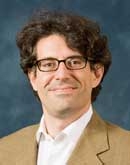 Silvio Savarese | Silvio Savarese is an Assistant Professor of Electrical and Computer Engineering at the University of Michigan, Ann Arbor. After earning his Ph.D. in Electrical Engineering from the California Institute of Technology in 2005, he joined the University of Illinois at Urbana-Champaign from 2005 - 2008 as a Beckman Institute Fellow. He is recipient of a TWR Automotive Endowed Research Award in 2012, an NSF Career Award in 2011 and Google Research Award in 2010. In 2002 he was awarded the Walker von Brimer Award for outstanding research initiative. He served as workshops chair and area chair in CVPR 2010, and as area chair in ICCV 2011. He will be area chair in CVPR 2013. Silvio Savarese has been active in promoting research in the field of object recognition and scene representation. He co-chaired and co-organized the 1st, 2nd and 3rd edition of the IEEE workshop on 3D Representation for Recognition (3dRR-07, 3dRR-09, 3dRR-11) in conjunction with the ICCV. He was editor of the Elsevier Journal in Computer Vision and Image Understanding, special issue on "3D Representation for Recognition" in 2009. He co-authored a book on 3D object and scene representation published by Morgan and Claypool in 2011. His work with his students has received several best paper awards including a best student paper award in the IEEE CORP workshop in conjunction with ICCV 2011 and the CETI Award at the 2010 FIATECH's Technology Conference. His research interests include computer vision, object recognition and scene understanding, shape representation and reconstruction, human activity recognition and visual psychophysics. Silvio Savarese's research is sponsored by US government agencies such as NSF, ONR and Army as well as industrial partners such as KLA-Tencor, Ford, Toyota, TWR and Google. He is member and a principal investigator of the Giga Scale Research Center (GSRC). |
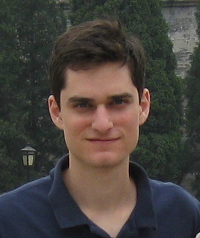 John Schulman | John Schulman is a PhD student in the EECS department at UC Berkeley. He works with Pieter Abbeel in the Robot Learning Lab (RLL). John graduated from Caltech in 2010 with a physics degree. His research focuses on robot motion planning and autonomous robotic manipulation, especially involving deformable objects. |
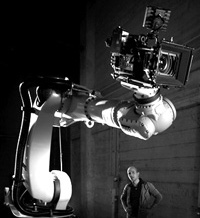 Ian Sherman | Ian Sherman is the lead engineer at Bot & Dolly, a design and engineering studio in San Francisco working to advance motion control and automation as a creative medium. For the past two years Ian has led the software development effort at Bot & Dolly, building tools to make modern robotics accessible in industries such as film, stage, and architecture. |
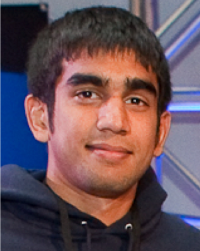 Arjun Singh | Arjun Singh (BS UC Berkeley) is a PhD student in the EECS department at UC Berkeley and Berkeley's lead developer for the edX platform. He works with Pieter Abbeel in the Robot Learning Lab (RLL). He as worked on autonomous helicopters, robotic laundry folding, and now works on computer vision for robotics and technology for education. He led the development of the Coursesharing online education platform, which was merged into the edX platform. |
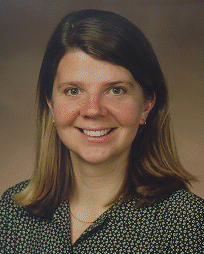 Claire Tomlin | Claire Tomlin is a Professor of Electrical Engineering and Computer Sciences at the University of California at Berkeley, where she holds the Charles A. Desoer Chair in Engineering. She held the positions of Assistant, Associate, and Full Professor at Stanford from 1998-2007, and in 2005 joined Berkeley. She received the Erlander Professorship of the Swedish Research Council in 2009, a MacArthur Fellowship in 2006, and the Eckman Award of the American Automatic Control Council in 2003. She works in hybrid systems and control, with applications to air traffic systems, robotics, and biology. |
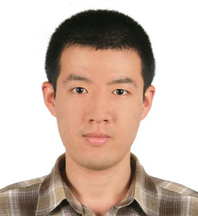 Cong Wang | Cong Wang is a PhD student in the Mechanical Engineering department at UC Berkeley. He works with Masayoshi Tomizuka in the Mechanical Systems Control (MCS) Lab. |
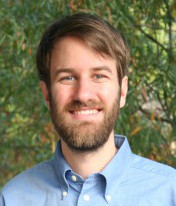 Ryder Winck | Ryder Winck is a postdoctoral scholar in Mechanical Engineering at Stanford University. He works with Allison Okamura in the CHARM Lab. His research interests are in control systems and robotics. His current research focuses on bilateral teleoperation of robotic systems for satellite repair using model mediated teleoperation. Other current research interests are on the control of large sets of subsystems using a limited number of control inputs. He earned his M.S. and Ph.D. degrees from Georgia Institute of Technology and his B.S. degree in Mechanical Engineering from Rice University. |
